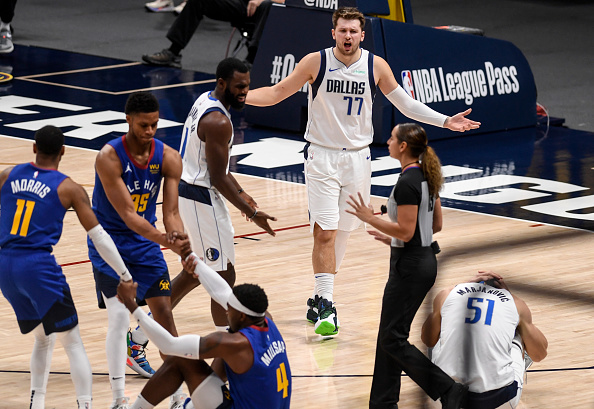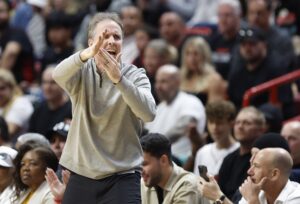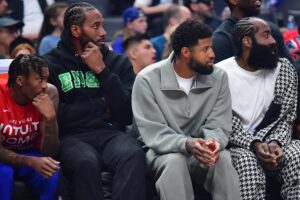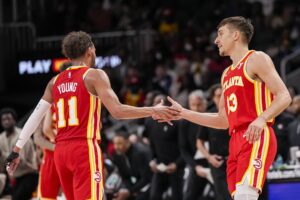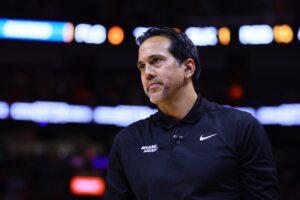As the entire NBA universe waits for Donovan Mitchell and Kevin Durant trades that may never come, it’s time to take stock of the flurry of activity that defined the past two weeks of the NBA offseason. We’ve previously discussed the biggest winners of the NBA’s free agency period. Now, we move on to the teams that have inspired our biggest questions to be answered this upcoming season.
These teams all made the playoffs last season around young stars but will field revamped rosters next season, and not always by choice. Will those changes lead to improved team success next season or beyond?
NBA Offseason Questions
Minnesota Timberwolves
The Minnesota Timberwolves’ stunning trade for Rudy Gobert this NBA offseason was seismic and will define this franchise for the next decade. The draft assets (detailed in the previous link) are massive, and the Wolves lost shooting with Patrick Beverley and Malik Beasley moving to the Utah Jazz. Minnesota built the NBA’s seventh-best offense in part by shooting threes at the second-highest rate in the league.
Jaden McDaniels shoots 33.8% from three for his career and will likely start in place of Beverley (a 37.8% career clip). New addition Kyle Anderson will further cramp things, as he shoots just 33.4% and replaces Beasley’s 38.6% career mark. Beasley’s absence will be painful as he became one of the top perimeter threats in the league by averaging over eight three-point attempts per game in Minnesota.
The Wolves hope Gobert’s rim protection will lead to a defensive improvement that more than offsets any decline in offense. It’s inaccurate to compare the Gobert-Karl Anthony-Towns duo to the frontcourts with the Boston Celtics and Memphis Grizzlies, however. Those teams play two bigs from a position of strength: all four of Al Horford, Robert Williams, Jaren Jackson Jr., and Steven Adams can protect the rim well. Towns allowed the Grizzlies to make 65.4% shots at the rim in the playoffs, making him closer to Nikola Vučević than those four on defense.
Will Minnesota’s improved defense offset any possible declines on offense? Anthony Edwards handling the ball more and turning D’Angelo Russell into an off-ball shooter could help. Will that lead to enough winning to justify the Gobert trade? Finding out will be fascinating.
Atlanta Hawks
The Atlanta Hawks did what many wanted this NBA offseason and executed a trade that will reshape their team’s identity. Dejounte Murray gives Atlanta a second ball-handler to diversify the offense around Trae Young. In many ways, this is a lesser version of the Gobert-Minnesota trade. Murray is good but hasn’t matched Gobert’s impact to date. Then again, Atlanta did not have to surrender as many picks. The Hawks also traded Kevin Huerter to the Sacramento Kings to clear Murray’s way in the starting lineup and replace a draft pick they sent out in the Murray deal.
Atlanta likely made this move to improve their defense. Murray immediately becomes their best and most reliable perimeter defender, and he can cover for Young much better than Huerter on that end. The deal’s success will be determined by how well the point guards fit offensively. Can Young overhaul his game for the benefit of the team? Murray will need to handle the ball as much or more than Young for the offense to work. Last season, Young…
- Took just one catch-and-shoot three a game (shooting 48.1% on these, 38.2% overall)
- Was third in the entire league taking 12 pull-up (self-created) shots per game
- Held the ball longer than all but two players, and
- Averaged more dribbles per touch than any player in the league.
Murray probably won’t be able to consistently space the floor for Young. He made just 34.5% of his 2.5 catch-and-shoot threes last season. Having Young off the ball creates more driving lanes for everyone, and Murray could improve significantly by driving into the open space. Murray has only known the cramped confines of the San Antonio Spurs offense during his pro career. Atlanta was the second-best three-point shooting team in the league last season and averaged about 3.5 more attempts per game than 18th-ranked San Antonio.
Dallas Mavericks
The issues started last year for the Dallas Mavericks when they did not offer Jalen Brunson a contract extension after he struggled against the LA Clippers in the 2021 playoffs. Brunson emerged as their second-best player last season. He led Dallas to a 2-1 series lead against the Utah Jazz in the first round despite Luka Dončić missing those games with injury. Brunson’s move to the New York Knicks severely weakens this roster, and the Mavericks had no cap space to sign a replacement. Spencer Dinwiddie will likely start in Brunson’s place, but who will provide bench scoring?
It could be Christian Wood after Dallas dealt for him before draft night. This trade isn’t a clear win like the similar deal that saw Malcolm Brogdon join the Celtics. Wood has played for six teams in six NBA seasons and bounced around the G League. He has never made the playoffs or even been on a team trying to make the playoffs late in the regular season.
Wood has defensive questions but should play center, where he has more matchup advantages on offense than at forward. So it’s unclear why Dallas also signed the backup center of the team they defeated in the second round of the playoffs (the Phoenix Suns) in JaVale McGee. McGee is 34, signed a three-year contract with Dallas, and has been promised a starting position.
Dallas just made the Western Conference Finals on the back of their small lineup. They scrambled to cover massive amounts of ground on defense and spaced the floor for Dončić on offense. Dallas benched Dwight Powell for Maxi Kleber, who will lose minutes to Wood and McGee. They may look to move Powell, the longest-tenured player on their roster, due to financial constraints. One has to wonder: is Dallas’ front office abandoning the identity that got them to the Western Conference Finals?


